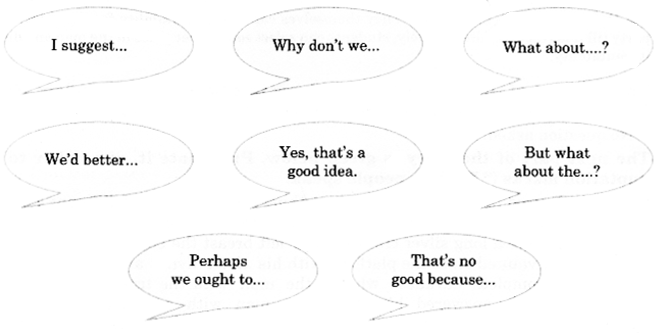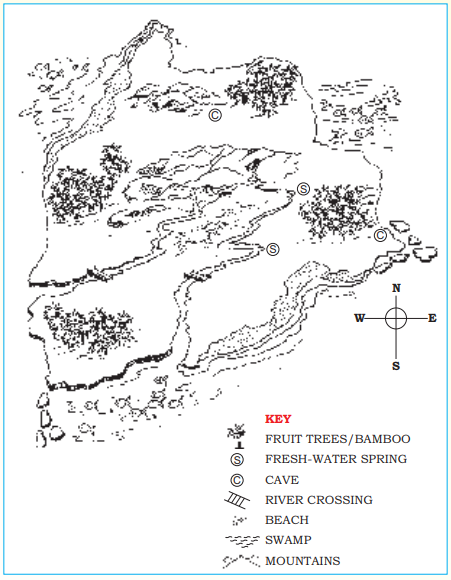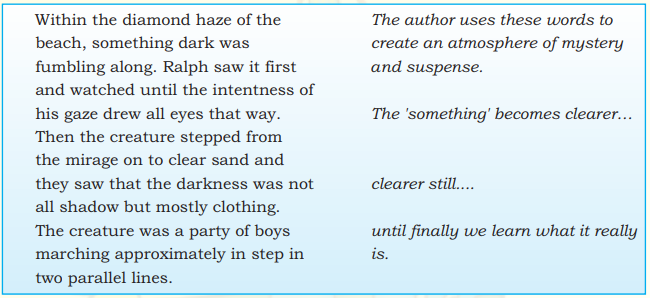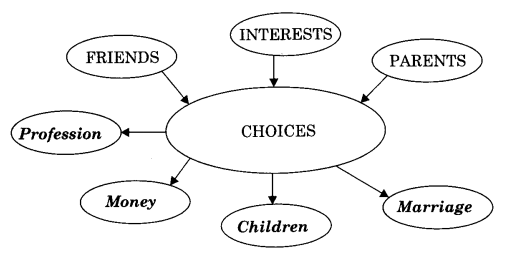NCERT Solutions for Class 9 English Main Course Book Unit 2 Chapter 2 The Sound of the Shell are part of NCERT Solutions for Class 9 English. Here we have given NCERT Solutions for Class 9 English Main Course Book Unit 2 Chapter 2 The Sound of the Shell.
| Board | CBSE |
| Textbook | NCERT |
| Class | Class 9 |
| Subject | English Main Course Book |
| Chapter | Unit 2 Chapter 2 |
| Chapter Name | The Sound of the Shell |
| Category | NCERT Solutions |
CBSE Class 9 English Main Course Book Unit 2 Adventure Chapter 2 The Sound of the Shell
TEXTUAL EXERCISES
(Page 30)
Question 1.
Listen to the first part of the tape, and answer the two questions you are asked.
Then listen to the rest of the tape, and answer the following questions :
(a) Now that you have heard the rest of the extract, what do you think happened to the boys ? What do you think happened to the plane they were flying in ?
(b) What happened to the other part of the plane ?
(c) How did Ralph attract the attention of the other boys ? .
(d) What were the names of the first three boys who came to the meeting ?
(e ) Why do you think groups of boys were marching in two parallel lines ?
(f) Do you think there were any adults on the island ? Why / Why not ?
(g) Can you predict what happened to the boys next ? For example, how did they organise themselves ? What about shelter and food ?
Answer :

They have been dropped on the island by an aeroplane :
(a) The boys have landed on an unnamed island safely. The plane in which they were flying was in flames. It must have fallen into the sea after being shot at.
(b) The other part of the plane might have been blown off or destroyed.
(c) Ralph attracted the attention of the other boys by blowing into the conch.
(d) The names of the first three boys who came to the meeting were Johnny, Sam and Eric.
(e) They were marching in two parallel lines because Jack, their leader, had asked them to do so, and he was leading them too.
(f) There were probably no adults on the island. The pilot was an adult but he did not land here. Perhaps he had thought it better not to land there due to safety reasons.
(g) The prediction is difficult to make. However, one thing is clear. It is that the boys had the capacity to survive. Jack had the leader-like qualities. He could organize other boys well. First of all, all of them together must have searched for shelter and food to live on. The island seemed to be unnamed and uninhabited. Also there seemed to be no inhabitants there. So there was danger to them. They probably found some cave to live in.
Question 2.
Imagine that you are one of the boys, and that the map on the next page is the island on which you have landed. Your most urgent task is to decide where to live. Work in groups of four ; decide where to set up camp, and the materials you will use. Be prepared to justify your choices to the rest of the class.

Answer :
(In the form of dialogues among a group of boys) :
Sonu : I think that this island seems uninhabited. No one knows when we may be rescued. I suggest to first select a safe and suitable place to remain till we are rescued. It must be near the fresh-water spring. There should be fruit trees nearby. The nearness of the caves can be to our advantage. Such a place can be in the eastern middle part of the island.
Anu : What about the materials to build up a hut ?
Sonu : We can get wood and dry grass from near the trees.
Rohit : Where shall we have water to drink ?
Sonu : We can have it from the river, though it is at much distance.
Punit : That is not good because we cannot cover a long distance. There is also a swamp nearby.
Sonu : The swamp is in between the two rivers. The nearby caves can serve our needs.
Anu : Perhaps we ought to be near the sea beach. A rescue team may find us easily. I suggest another place to north-west, near the caves.
Sonu : That is not good because the fresh water would be at a great distance. Water cannot be stored by us. Besides, the hills can be to our advantage. We can attract the attention of the rescue party flying overhead from the hills. Moreover, there are cliffs hanging over the beach to the southern side also. These will enable us to watch this side far and wide. The vast stretch to the north east side opening on the sea can supply us fish etc.
Rohit : Yes, that’s a good idea. We should camp where Sonu suggests. (All agree).
All in a chords : So, let us prepare to set up the camp to the south-east, in between the river and caves near the beach.
Note :
Students are advised to spot the place indicated in the above dialogue on the map given in the Main Coursebook on

They themselves can see its suitability for the safety of the party till it is rescued. Alternatively, students can select some other place in the map and discuss its suitability.
Question 3.
The last part of the extract that you have just heard is given below. Notice how the author creates interest through a step-by-step organization of his ideas.
Answer :

Question 4.
The next part of the story is given below. Punctuate it, remember to use quotation marks (“ ”) when people speak. they were dressed in strangely eccentric clothing shorts shirts and different garments they carried in their hands their bodies from throat to ankle were hidden by black cloaks which bore a long silver cross on the left breast the boy who controlled them came forward vaulted on to the platform with his cloak flying and peered into what was almost complete darkness wheres the man with the trumpet ralph sensing his sun blindness answered him theres no man with a trumpet only me the boy came close and peered down at ralph screwing up his face as he did so he turn quickly isnt there a ship then he was tall thin and bony his face was crumpled and freckled out of his face stared two light blue eyes frustrated now and turning or ready to turn to anger isn’t there a man here ralph spoke to his back no were having a meeting come and join us
Answer :
They were dressed in strangely eccentric clothing—shorts, shirts, and different garments they carried in their hands. Their bodies from throat to ankle were hidden by black cloaks, which bore a long silver cross on the left breast. The boy who controlled them came forward, vaulted on to the platform with his cloak flying, and peered into what was almost complete darkness.
“Where’s the man with the trumpet ?”
Ralph, sensing his sun-blindness, answered him.
“There’s no man with a trumpet, only me.”
The boy came close and peered down at Ralph.
Screwing up his face as he did so, he turned quickly, “Isn’t there a ship, then ?”
He was tall, thin and bony. His face was crumpled and freckled. Out of his face stared two light blue eyes, frustrated now and turning or ready to turn to anger.
“Isn’t there a man here ?”
Ralph spoke to his back.
“No, we’re having a meeting. Come and join us.”
Question 5.
Imagine that you are on an uninhabited island with a group of children of your age. In groups of four, discuss and enumerate the strategies adopted by you to survive. You can think on the lines of

Mainly meant for discussion in groups at class level. Some strategies to be adopted for survival are given below. These would help greatly in the discussion asked for.
food :
First of all, food to be hunted for—should not be poisonous—fruits will do—quality of food fruits to be assessed from their appearance and instinctive judgement—to be tested from taste first —Fruits if eaten by monkeys or other wild animals can be good. If not, these could be risky. To be discussed who would go for finding them and where….. .
Shelter :
Shelter to be protective from weather-if it rains heavily, caves could be useful—caves to be safe from wild animals also—an instinctive sense of survival to be used to find a suitable shelter, that is, how to escape in case of a sudden danger.
means of escape :
Place for shelter to be safe from wild animals-using sticks, stones, means of camouflaging to be used-shelter to be chosen with a view to having means of escape in case of sudden danger.
protection against animals :
Since the place is uninhabited, wild animals could be there-protection from them essential—caves, branches of trees, hilltops, stones, sticks, fire, firewood to be useful in case some animals attack—vigilance turn-wise necessary while resting, sleeping-safety be insured.
life-skills (problem solving , decision-making) :
Survival instinct to be prominently used—if problems arise, these must be solved instantly, that is, if some animal poses a danger, crying, shouting etc, will scare it off—secondly, if one has to escape, escape must be instant- no delay—no panic—no impatience-everything should be handled with a cool mind with a grip on life-saving methods.
protection against harsh climatic conditions :
Harsh climatic conditions to be handled with utmost harsh climatic conditions care—eg, caves should be searched to protect oneself from winter or rain—bushes, leaves of trees should be used to make some comfortable bedding—dry logs to be used to make fire in case it is harsh winter—sunlight to be useful to fight chill …… .
Question 6.
Imagine that you have just returned from Topo Island. The Editor of a local newspaper has asked you to write about your adventure. Write the article.
Some hints :
- Very briefly, describe how you landed on the island, and the main features of the island.
- Write about where you set up camp, one main adventure, and how you were eventually rescued.
- Make the adventure part of your story exciting, with lots of action.
- Include dialogue in the adventure part.
- Try to create mystery and suspense, as in B.3.
- Finally, give your adventure story a suitable heading.
- Your story must be written in paragraphs and carry your By line.
Answer :
I, with my friends, had been evacuated at last. We were being taken to an unknown destination. Soon our plane was suddenly shot at from below. It burst into flames. But one part of its body with all of us safe fell down to the earth. The other part had fallen into the sea. Soon we found that it was an unnamed (unmanned) island with hills, forests, rivers, caves, swamps etc.
We came out of the burnt plane. We went up a hill. To our west there were thick fruit and bamboo trees and behind us there were caves. Just opposite us there flowed a river into two streams. There was a swamp between these two ‘rivers’. To the east there were trees and caves. The coast down to the south had huge cliffs. The island, was spread over an area of thirty kms. It was surrounded by sea. We soon found a fresh water spring.
The immediate need was of searching a place for shelter since we never knew how and when we could be rescued. So we began to search a place for a camp with fresh water supply and some fruit trees nearby. When we had gone ahead, we heard a mysterious cry. I said to Praveen, “What bird can it be calling so mysteriously ?” He was dazed but said, “It might be a bird, animal or a demon who swallows the victims alive ”. The cry was heard again. To our amazement we saw a shadow approaching. “Look, Praveen ! We are gone”, I exclaimed. He yelled like a mad man. I caught the shadowy figure. To our amazement it was Ram. He had tried to scare us.
Finally, we selected a place in between the trees and the fresh water spring. It was at the east-southern coast for setting up a camp. We brought the dry branches, wood, dried grass and leaves from the nearby trees. We thought it a safe place. In case of danger, we could go to the caves nearby. The cliffs could help us in attracting the attention of the rescuing party.
Soon after two days a helicopter spotted us and we were rescued. Our courage, fearlessness, and comradeship and, above all, the jungle sense, kept us alive. We came to know that this was called Topo Island. I would call the whole adventure a Jungle Ordeal.
Question 7.
Look at the map of Topo Island in B.2 and read the notes below. Then complete the tourist brochure.
Notes :
- Beaches : 6 km north-west coast, 6 km south-east coast ; relax
- Fishing : near beach on north-west coast
- Adventure seekers : caves, mountains
- Trees : fruit, shade if day is too hot
- Lookout Point : can see whole island
Visit Topo Island for the Holiday of a Lifetime :
Here is the perfect paradise for holiday-makers – Topo Island. You __1__ Fishing __2__ If it’s adventure that you’re after, __3__. Fruit trees found on most parts of the island __4__ And the Lookout Point on the northern tip of the island __5__ . Come to Topo Island, where dreams come true.
Answer :
- can relax with full leisure on its long beaches which are 6 km north-west and 6 km south-east coasts.
- near the beach on the north-west coast is a pleasure in itself.
- you can venture into the nearby caves or climb the mountains.
- add pleasure to the holiday-making, besides providing shades if it is too hot.
- is the whole of the island.
We hope the NCERT Solutions for Class 9 English Main Course Book Unit 2 Chapter 2 The Sound of the Shell help you. If you have any query regarding NCERT Solutions for Class 9 English Main Course Book Unit 2 Chapter 2 The Sound of the Shell, drop a comment below and we will get back to you at the earliest.







